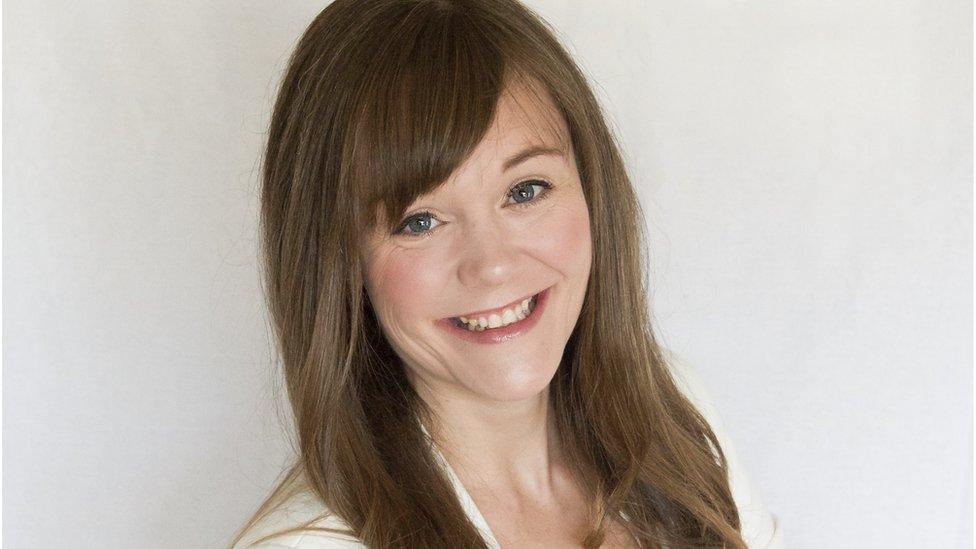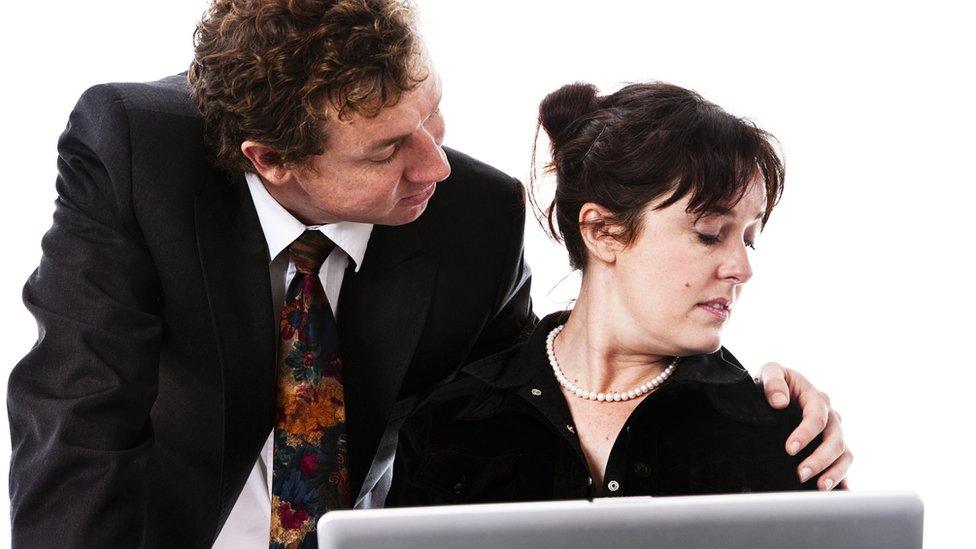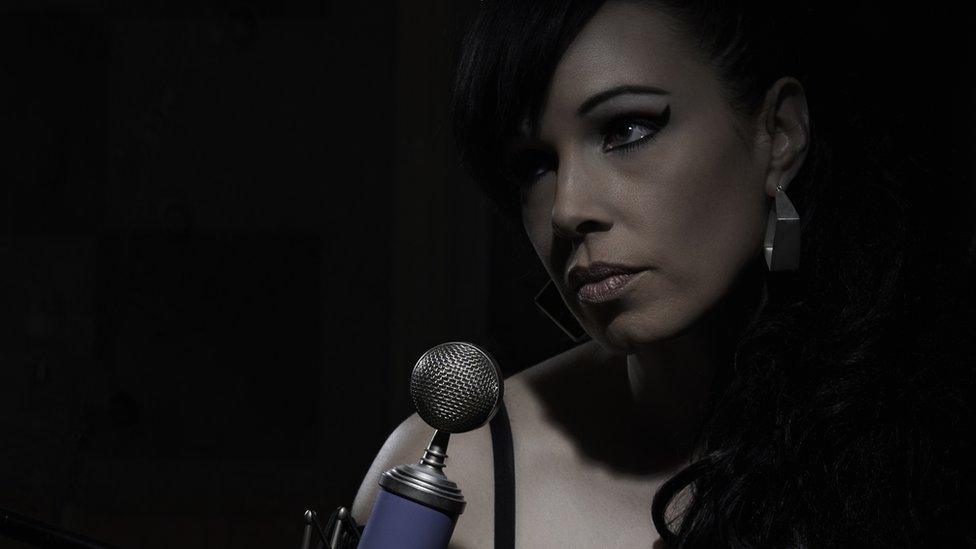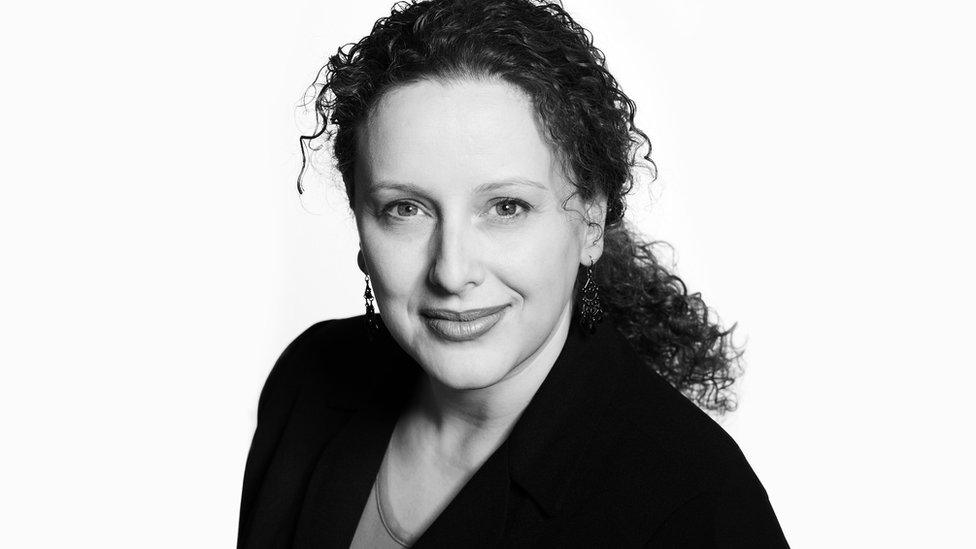Do you have to avoid huggers at work?
- Published

Hugging at work is apparently on the rise
Are you a hugger or a hand shaker - or neither? When a work colleague returns from holiday or maternity leave, do you go in for the double bear-hug, or a friendly hello from across the desk?
For those people who prefer a non-physical greeting, the direction of office etiquette may be moving against you.
There is evidence that workplaces are seeing a rise in hugging culture. In a survey, external last year more than half of advertising and marketing executives said hugging was common, up from a third in the survey in 2011.
Experts say it could have a lot to do with more relaxed workplace environments.
But there's a downside. A separate study, external last year on sexual harassment in the US fast food industry found that more than a quarter of workers felt they were hugged inappropriately.
Deborah Wallsmith, an assistant professor of anthropology at Kennesaw State University, Georgia, says that the gradations of hug discomfort depend upon nuances, relationships, and personal preferences.
"The least offensive is the one armed side-by-side hug, where the huggers are standing next to each other, and extend their adjacent arms around each other's waist.
"The most objectionable is the full-frontal squeeze that goes on forever."
She adds that she "feels uncomfortable getting hugged by former professors and former bosses".
Kara Deringer, a business coach from Alberta, Canada, explains that context is all-important. Yet many people get it wrong.

Kara Deringer accepts that hugging is a social minefield
She agrees that hugging can be very useful. "It creates connections." But on the other hand, she says: "Be careful. I have seen lots of misunderstandings.
"I currently work in a team, and we're huggers. But there are those who will courageously say 'I'm not a hugger'."
Ms Deringer recommends either asking people for a hug, or paying very close attention to body language. "If they reach out their hand? I've got it, they're hand shaker or a high fiver."
And beware another minefield - the sociological layers of power, culture, and gender. All can have their own "rules" for physical contact, says Ms Deringer. "It's also about social intelligence - I won't hug someone I just met."
Tracey Smolinski is also in a work culture where hugging is acceptable.
The chief executive of Cardiff-based Introbiz, which hosts business networking events, says: "We are quite a friendly team, and usually give a kiss on the face, both cheeks, when we are familiar with them.
"But if you don't know them, best not to kiss or hug, because you don't know how they will take it. You have to be careful."
Some of this may sound like commonsense. But what if hugging is standard practice in your office, but you really don't want to indulge? Are you the office grinch?

One person's hug can be very unwanted
Toronto-based musician Cynthia Pike-Elliott, who has had careers in healthcare and law enforcement, says that in both environments hugging was standard.
"Hugging was a huge part of my workplace, a huge part in maintaining these personal relationships," she says. For her, hugging is "a way to say to someone that you've made a connection with them, and that you trust them… It's not hurting anyone.
"If I was an employee, a hug from my employer would show their pride and gratitude of a job well done much more than words could ever accomplish," she says.
Ms Pike-Elliott adds that if a business owner hugs a client, it "shows trust and validates that the client is special, it builds a solid relationship".
In her role as a musician she has found colleagues and acquaintances more "huggy" than most. "Music and arts is about revealing your soul. It's very personal," she says.

Cynthia Pike-Elliott says that in her industry, hugging is very common
Not everyone's so keen on the idea of hugging, however. Sometimes, it ends up in court.
Earlier this year, California corrections officer Victoria Zetwick California accused her superior, the county sheriff, of giving more than a hundred unwanted hugs over a dozen years. A court said it was enough to constitute a "hostile environment".

More stories from the BBC's Business Brain series looking at quirky or unusual business topics from around the world:
The homeowners hiring out their houses as film sets
Is humour the way to keep an office happy?
Putting the fun back into dance classes

Canadian labour lawyer Shaun Bernstein advises against hugs in the office, particularly in light of the province of Ontario's update to its Occupational Health and Safety Act last September.
This included more provisions against workplace harassment and unwelcome attention.
Mr Bernstein says: "If the hug is taken in the wrong way, it can easily be construed under the law as workplace sexual harassment, which places a responsibility on the employer to investigate...
"There's the specific prohibition when it comes from a person in power, so I think that that's important to note."
It is also the responsibility of the company to have a designated harassment complaints officer, as well as a back-up person in case the officer is the one causing trouble.
Mr Bernstein adds: "Employers have a serious responsibility when it comes to protecting their workers against harassment, and are obligated to have policies in place to prevent this kind of conduct."

Always remember that work friends are not the same as real friends, says Adina Zaiontz
For Adina Zaiontz, chief executive of Napkin Marketing, in Toronto, the simple rule is: "When in doubt, don't hug... Everyone feels differently about personal space and boundaries." It's possible to hug and still avoid full body contact, she adds.
So, when does she feel it's OK?
Someone you are close to at work is very upset, and confiding to you about a death or personal tragedy in their life
Someone you are close to at work is telling you big, happy personal news, "I'm engaged!" "I'm pregnant!"
A close co-worker or employee is telling you they got a new job, and the departure is on good terms
You meet a colleague whom you haven't seen in a very long time
You're at a party and everyone is being a little extra huggier
Ms Zaiontz adds: "No matter what you think, your work friends are different than your real friends. Your real friends can't call HR on you."